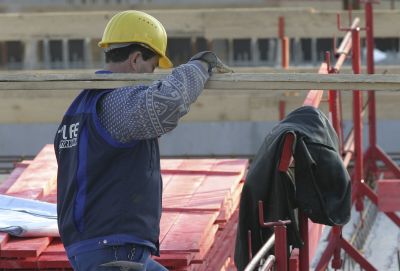The deaths of more than 30 construction workers on building sites across Europe over the last four months show the urgent need for EU action to raise safety standards in the sector.
The spate of fatal accidents involves many cross-border and migrant workers, who are more vulnerable to exploitation through subcontracting, undeclared or illegal work, and bogus self-employment.
The number of fatal accidents across construction is increasing across Europe, according to the latest data from Eurostat, however many also go unreported.
Fatal accidents in the construction sector since October 2023:
- 21 February 2024 - the Netherlands: Two construction workers killed, others severely injured, in an accident on a work site (accident with a crane).
- 16 February 2024 - Italy: Five construction workers killed by a collapse on a building site in Florence, several more were injured.
- 18 January 2024 - France: Two construction workers killed (collapse of a wall); French statistics report on average 1 fatal accident/day in construction.
- December 2023 - Spain: Nine construction workers killed in the month of December, double the number of the previous month.
- 11 December 2023 - Sweden: five construction workers killed in another horrific accident. A few days later, another worker killed (crash of construction elevator).
- 30 October 2023 - Germany: A dramatic accident with a collapsing scaffold in an elevator shaft killed four construction workers.
In the recent Italian tragedy, one deceased worker is Italian while the others are migrant workers from Morocco and Tunisia. Unscrupulous employers, unresponsible practices of subcontracting and posting, too little attention to safety rules, lack of training, difficulties in clear communication, insufficient inspections.
The tragedies show the need for a special fund to be established to support the families of migrant workers killed in accidents.
The European Trade Union Confederation (ETUC) and the European Federation of Building and Woodworkers also called for European and national policy makers to take the following action:
- National and EU statistics for accidents at work, including fatalities; detailed per sector, and with a particular attention for posted and mobile workers;
- To limit subcontracting and ensure joint and several liability throughout the chain. We want direct jobs and quality jobs;
- To ban agencies and other intermediaries in posting in construction;
- Safe and healthy workplaces for all workers via the strict compliance with EU-OSH law;
- Strict practice of OSH training for all construction workers and specific training for professions like scaffolders or crane operators – towards European minimum standards for this training;
- Facilitate and support the work of labour inspectors;
- A financial support fund to assist posted and migrant workers and their families including third-country nationals in case of fatal accidents, severe injuries, as well as in case of occupational diseases;
- Digital solutions to identify and monitor in real time the presence of workers and self-employed on construction sites (check-in/-out) and with real-time access to data for labour inspectorates;
- Public clients to set the example. Publicly funded construction sites should have the highest health and safety standards in place and enforced. They should have strict rules for socially responsible and progressive tendering processes, including to ensure that public money goes to organisations that respect workers’ and trade union rights, that negotiate with trade unions and whose workers are covered by collective agreements.
EFBWW general secretary, Tom Deleu said:
“The time for symbolic actions has long passed. The European Union must deliver for workers. The free movement of services and the free movement of companies can never be more important than the protection of workers’ lives and livelihoods. We need to regulate the Internal Market in a stronger way. We need to limit subcontracting. We need a Social Progress Protocol”.
ETUC General Secretary Esther Lynch said:
“No one should have to put their life at risk to earn a living. Workplace deaths hurt whole families too. It is time to hold employers accountable and to stamp out abuses in the subcontracting chains. Workers demand urgent actions to make zero deaths at work and because of work a reality”.

